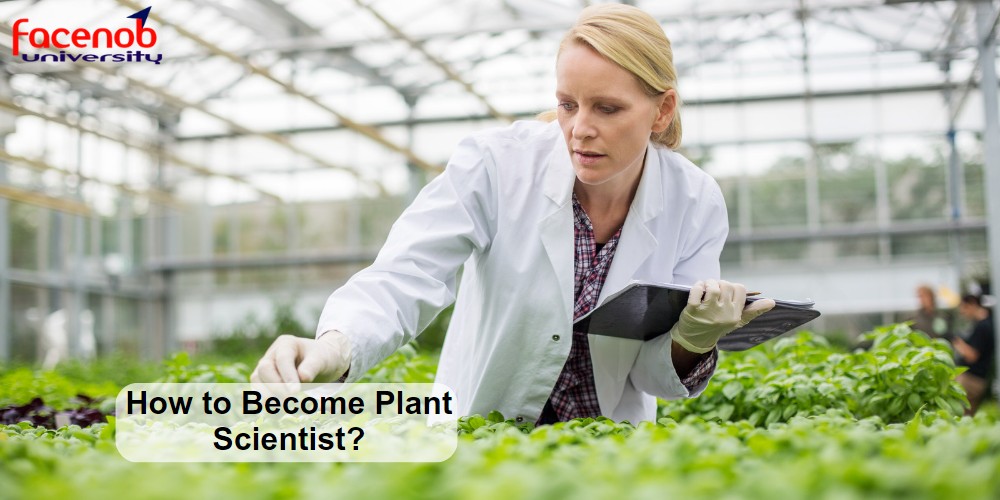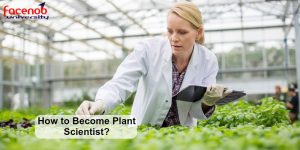How to Become a Plant Scientist?

Introduction of Plant Scientist
These “fantastic” experts advocate for an agriculturally, environmentally, and economically sustainable rise in world food supply by implementing tried-and-true methods of raising crop yields while minimizing environmental damage. They are known as Plant Scientists.
Similar Job Titles
- Soil Scientist
- Microbiology Soil Scientist
- Research Soil Scientist

Typical Job Responsibilities
What do Plant Scientists do?
A Plant Scientist would typically need to:
- Plants are being studied, and experiments are being carried out to ensure that food, livestock, and fiber crops can meet the demands of a growing population without destroying natural resources.
- Examine soil composition and its effect on plant growth; investigate plant breeding and cultivation and harvested yield.
- Use their geographic location and physical characteristics to identify new species of flora.
- Gather plant, algae, fungal, and moss specimens for study and classification in herbariums and laboratories.
- Perform laboratory studies on the gathered samples to assess their chemical makeup and physiological response to external stimuli.
- Conduct field research to evaluate hypotheses about plant growth and development.
- Conduct plant species surveys in a given habitat, such as a meadow, woodland, or moorland.
- Analyze soil and crop reactions to alternative plant-growing methods, such as genetic modification.
- Change soil settings to grow non-indigenous plants; measure plant growth to determine the effect of changing circumstances on growth rate.
- Study plant populations in different locations to learn about the effects of pollution, drought, and agricultural pests.
- Investigate the use of plant cells, structure, and function in medicine; extract useful compounds with antibacterial or antioxidant characteristics.
- Diagnose plant illnesses and offer appropriate treatment approaches; investigate solutions for safely rehabilitating and reusing hazardous soil.
- Analyze soil and groundwater contamination to determine how to change the polluted area’s physical, chemical, or biological properties.
- Investigate the habits of beneficial insects to stimulate their growth and pests to limit their invasion and potential crop harm.
- Maintain the laboratories and greenhouses where samples are stored or studied.
- Data collection and analysis, study findings documentation, and policy interpretation
- Write research reports and develop presentations for scientific and non-scientific stakeholders.
- Offer recommendations to food growers on optimizing the use of their land and the crops that would thrive on their property.
- Monitor land conservation projects and waste management programs for farms, including composting.
- Integrate knowledge of plant science into pertinent aspects of land management and ecosystems.
- Determine the causes behind a dwindling bee population and determine ways to increase pollen production, which is crucial to the agricultural system.
- Draft proposals, make bids for new research projects and funding, make presentations, give seminars, teach and advise students if teaching.
- Tender for work, report to, and advise clients if working as a consultant
- Protect local plant life, promote public awareness, or manage unique plant collections at a botanical garden, if working in conservation
- Survey undeveloped land and help in determining whether it should be classified as conservation land
- Liaise with like-minded colleagues in ecology, environmental science, geology, genetics, conservation biology, plant breeding, and hydrology
Standard Work Environment
As a Plant Scientist, you may be required to combine laboratory, office, and outdoor tasks on farms and other agricultural sites.
Higher education employees frequently divide their time between lecture halls, classrooms, laboratories, and offices. If you are interested in foods, you may spend long hours researching and testing novel food processing technologies in kitchens.
You might be part of a team of numerous scientists working together to develop new procedures while improving existing products and processes in the area. The role requires a close connection with farmers, conservation organizations’ employees and volunteers, and local and national government and industry representatives.
Frequent daytime travel to various work sites and overnight/international excursions to carry out research projects and attend conferences and training may be required.
Work Schedule
Most Plant Scientists work full-time and regular workweeks of eight hours daily, Monday through Friday. Seasonal field research may necessitate long hours and weekends to make the most available time. Working with farmers or doing surveys may also necessitate ten- or twelve-hour workdays.
Employers
Seeking a new job may appear difficult. Plant Scientists can improve their job search by soliciting referrals from their network, contacting companies directly, using job search platforms, attending job fairs, leveraging social media, and contacting staffing agencies. Fieldwork, conservation, or corporate employment may provide an opportunity to work abroad. Civil service exams may be required for government jobs. Although most employment offers include long-term security, short-term contracts are the norm in the early phases of one’s career.
Plant Scientists are generally employed by:
- Commercial & Industrial Organisations
- Government Agencies
- Private Sector Companies
- Voluntary Environmental & Conservation Organisations
- Environmental Consultancies
- Food Production Companies
- Forensic Laboratories
- Higher Education Institutions
- Botanical Gardens
- Museums
- Advanced Research Centres
Unions / Professional Organizations
Professional societies and organizations, such as The Agricultural Network Information Collaboration (AgNIC), are essential for Plant Scientists who want to advance their careers or network with other professionals. Participation in one or more of these organizations adds value to your resume while strengthening your credentials and qualifications.
Workplace Challenges
- The need to walk on rough terrains such as marshes, peat bogs, or hillsides in all kinds of weather to gather samples
- Inherent hazards in working on rehabilitation of sites that have hazardous materials
- Probable risks when dealing with poisonous plants or hazardous chemicals without following safety precautions
- Physical exhaustion from carrying out fieldwork on one’s feet for the better part of the workday
- Discomfort from having to work outdoors in all kinds of climates across the globe
Suggested Work Experience
Each academic program in which a future Plant Scientist enrolls usually includes lab work and hands-on projects. Certain educational institutions may require a practical internship before giving a degree. Others provide work-study programs that allow students to divide their time between education and a plant science-related career.
When your tasks outside of the classroom precisely align with your teachings inside, you will get the most out of them. When more experienced workers turn seemingly ordinary occurrences into unique learning experiences, you may hear endless stories from them and gain significant hands-on knowledge. Opportunities to expand your contact network are a plus.
Vacation/voluntary lab work or sampling/surveying in soil-related fieldwork can provide further practical experience. Direct applications to colleges and universities, commercial enterprises, museums, botanical gardens, and government institutions with a special interest in plant research are encouraged.
To demonstrate your devotion to course providers and future employers, read about the profession and interview or job shadow specialists in plant science.
Recommended Qualifications
Most Plant Scientists have a bachelor’s degree in environmental science, soil science, or crop science from an agricultural university. On the other hand, employers prefer people with a master’s degree in the fields above.
The environmental science option allows students to pursue professions in water quality, contaminated site cleanup, or soil evaluation for proposed facilities and recreational sites.
Soil science and crop science, on the other hand, prepare students for largely agricultural-related occupations. Students learn how to boost crop yields and grow healthier food by better understanding the science behind soil and healthy plants.
I concentrated on sciences, math, geography, geology, and English in high school.
Certifications, Licenses, and Registration
Certification in plant science from a reputable and objective organization can demonstrate your proficiency in various plant, natural, and environmental-science-related domains and help you stand out in a competitive employment market.
Further certificates in soil science, horticulture, tree risk assessment, entomology, pest control advice and application, and crop advice may carry an 18% wage premium and qualify you for related licensure.
Certification normally requires a mix of education, experience, and examination, though criteria vary by location. Successful certification programs defend the public welfare by including a Code of Ethics.
Plant Scientists whose work includes soil science may be required to be licensed. An application, processing fees, an examination, and suitable education and experience are typically required. Check with your local or national plant science organizations to see whether you need to be licensed.
Projected Career Map
Regardless of their path, performance, experience, professional certification, and scientific publication drive a Plant Scientist’s career growth.
Professionals interested in higher education earn a Doctorate. They may secure a postdoctoral job or junior lectureship to rise to the readership or senior lectureship within five to 10 years. On the other hand, Plant Scientists who focus on fixed-term research-based professions may migrate to more challenging projects or organizations.
It will remind you that research and teaching roles remain extremely competitive, with limited research funding available and a growing number of freshly trained Plant Scientists entering the labor market.
Workers of a non-academic research entity, such as a government or business organization, can expect to advance to managerial or senior technical positions.
If you have extensive experience in a certain area of specialization, self-employment, private consultation, and contractual work become realistic possibilities with multiple chances.
Advanced degrees will enable you to apply your knowledge and talents to urban and regional planning and environmental conservation programs.
Job Prospects
Applicants with a postsecondary degree, the necessary certifications and licensing, and relevant work experience have the best job prospects.
Beneficial Professional Development
CPD will assist an active Plant Scientist develop personal skills and proficiency through work-based learning, professional activity, and other means.
If traditional schooling or self-directed learning is used.
Obtain a master’s or doctoral degree to teach or hold a highly sought-after research post at a university.
On-the-job training provided by employees might be generic, project-specific, or employer-specific. In-house staff development courses, postgraduate study, external courses, and workshops will all aid in the expansion of your skills and knowledge.
Keep up with the newest advancements in plant science and related fields, environmental concerns, and regulatory changes that may impact your work. Attending conferences will keep you updated on the newest developments in the sector while also providing important networking opportunities with other professionals.
CPD also allows for the acquisition and maintenance of desirable certifications and licenses. Engineering, geology, chemistry, surveying, and environmental science qualifications boost your chances of progression and enable you to work as an independent consultant.
Plant scientists can expect assistance and further training from their academic institution or Vitae, a non-profit global leader with over 50 years of experience boosting researchers’ skills.
Conclusion of Plant Scientist
Down-to-earth Plant scientists continue to work on their increasingly difficult goal to keep plants growing so that biological infrastructures worldwide may remain viable and the Planet can survive.
Advice from the Wise
“Wherever life plants you, bloom with grace.”
Explore Also: How to Become Petroleum Geologist?

You really make it seem so easy with your presentation but
I find this topic to be really something which I think I’d by no means understand.
It seems too complicated and extremely huge for me. I’m
looking ahead on your next submit, I’ll try to get the hold of it!
Escape roomy lista
Very interesting info!Perfect just what I was looking for!?